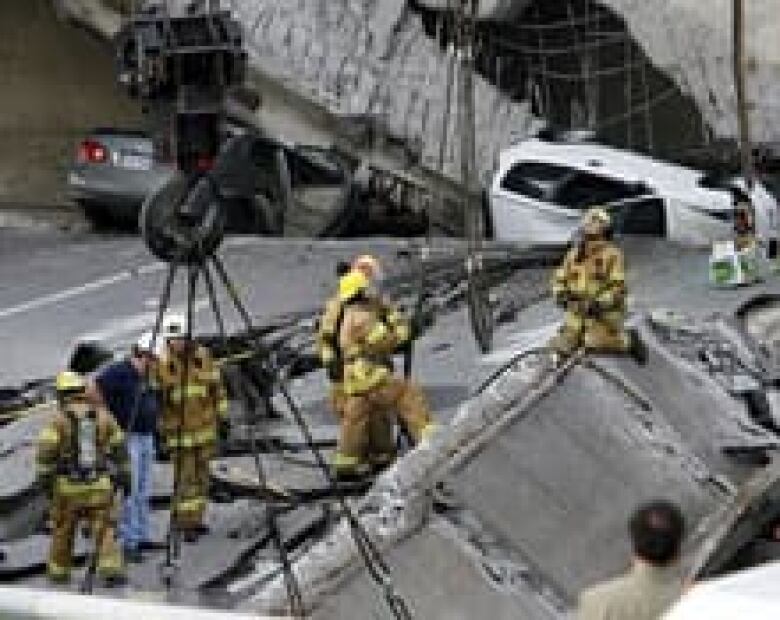Laval overpass tragedy leaves legacy of mistrust
Quebecers await report on fatal collapse
Joanne Bigras remembers the thick dusty smoke rising from the Concorde overpass after it cracked, split and crashed down on cars driving ahead of her.

The nurse rushed out of her car and scrambled over the rubble in search of victims. Then she saw the jagged edge of the severed overpass hanging over the tangle of concrete and metal.
"I was heading for that white car that was there. But once I saw what was over my head I thought: 'Back off, there's danger.' And that was the hardest thing I've ever had to do in my life, was back off," Bigras said in an interview with CBC News.
Bigras is still afraid to drive on overpasses. It's a fear that still haunts Quebecers who remember the vivid images of crushed cars and concrete from the fatal tragedy on Sept. 30, 2006.
Five people were killed, including a pregnant woman, and six more were injured when the Highway 19 overpass in Laval collapsed just before noon on a sunny Saturday.
One year later, Bigras's confidence in Quebec's highways remains shaken. "It's not nothing. It's too much too much of a tragedy that could have been avoided."
Tragedy shines light on roads
In the months that followed the collapse, the Quebec government ordered a public inquiry headed by former premier Pierre Marc Johnson, which heard from experts who testified how various technical reasons could explain the disaster.
Testimony at the commission also revealed troubling gaps in the design and maintenance of the province's infrastructure, prompting Johnson to issue a warning that other road structures are at risk.
Quebec transport officials ordered emergency inspections of 135 bridges and overpasses, some of which have since been closed or subject to weight restrictions.
Civil engineering professor Saeed Mirza believes the province's concerted attention on roads is late in coming. "All this should have taken place much earlier," he told the Canadian Press.
"It should not take an inquiry commission to come in and force the Ministry of Transport to do these things."
The province fell short maintaining road infrastructure and now has to make amends, Laval Mayor Gilles Vaillancourt told CBC News.
"If we want to pay a real tribute to the victims, I guess what we have to do now is make sure that dedicated funds for renewal of infrastructure is put in place right now," he said.
The Johnson inquiry's report, due Oct. 15, promises some insight to the tragedy, Mirza said. "They have investigated the whole system in detail, so I'm pretty sure they'll get to the bottom of why the overpass collapsed," he told CP.
Limited compensation for victims
While the Johnson report will provide an explanation for the tragedy, Quebec's no-fault insurance has left victims with little recourse.
The no-fault system virtually ensures any lawsuit launched won't be heard because the province considers injuries resulting from using an automobile to be car accident-related.
But the Concorde collapse should be treated as an event on its own, said former justice minister and lawyer Marc Bellemare. "When there's gross negligence or criminal negligence, the victims should be allowed to sue," he told CBC News.
Under no-fault rules, victims will be entitled to between $50,000 and $200,000.
Truck drivers barred from certain roads on Transport Quebec's restricted list said they will sue the government for damages.












_(720p).jpg)


 OFFICIAL HD MUSIC VIDEO.jpg)
.jpg)



























































































